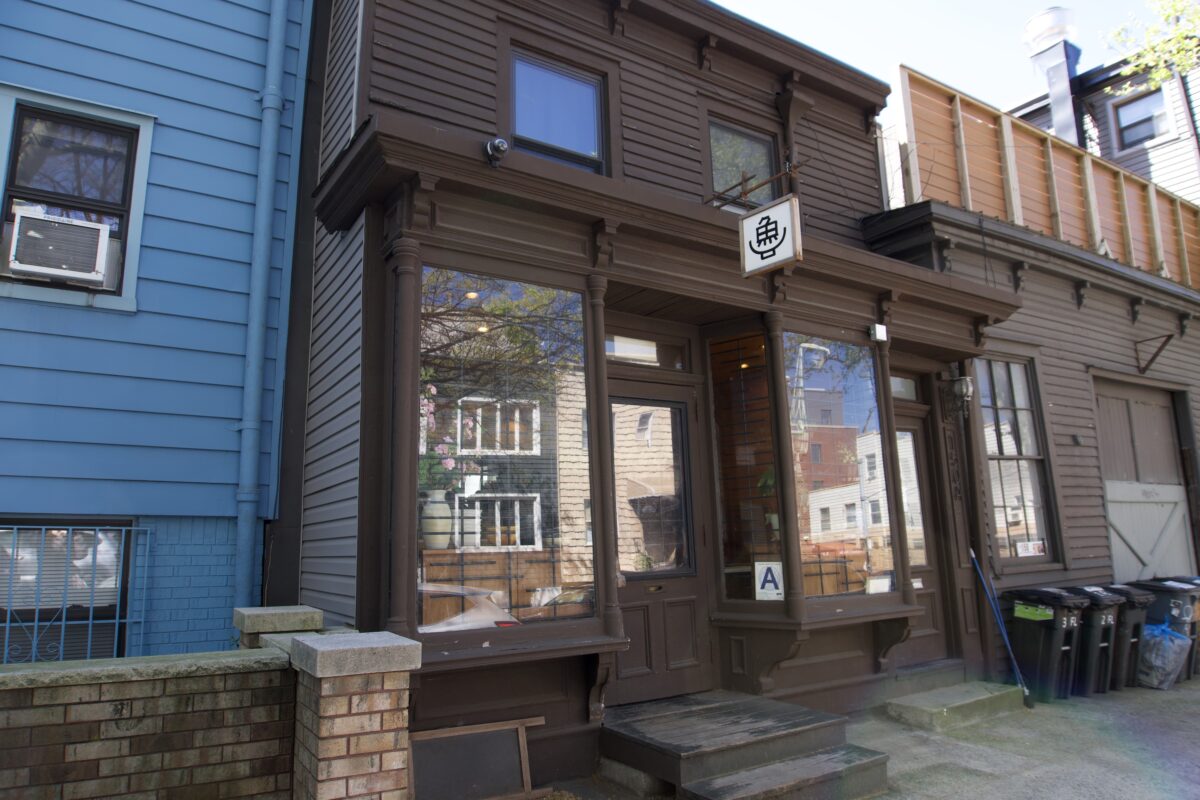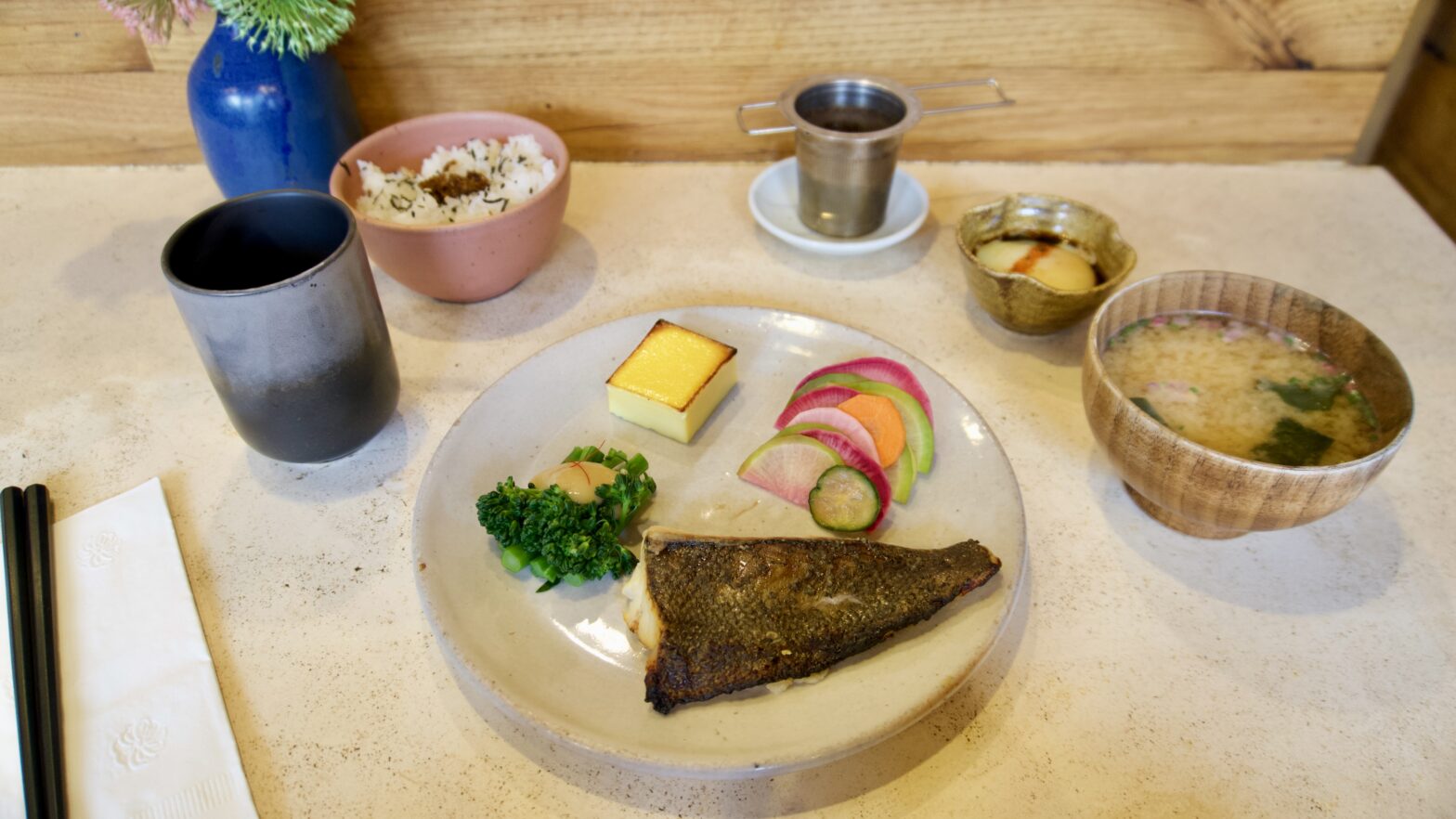Restaurant Diary is a biweekly series where food writer Clementine Hecker reviews restaurants that stand out among the millions of options in New York City’s restaurant scene.
Okonomi/Yuji Ramen is a petite restaurant that transitions between the two names and two separate menus from day to night. I have walked by the charming wooden facade regularly on my way to work, the morning seating of Okonomi always looking especially warm and inviting. While ramen is around every corner in Brooklyn, each spot claiming to have been born from some new creative genius with their own twist on traditional recipes, from 9:00 a.m. to 2:00 p.m. Okonomi offers something much more unique: Ichiju Sansai.
Ichiju Sansai is a traditional Japanese home style cooking that takes the form of a breakfast set, usually consisting of a bowl of rice, soup, a main dish (usually fish, meat, or tofu), and two side dishes. It literally means ‘one soup, three dishes,’ but the ingredients and the exact number of sides is not rigid in defining Ichiju Sansai, the balance of flavors and arrangement of simple healthy foods is.
Ichiju Sansai is a staple breakfast in Japanese culture for a reason, and when done well, it is the ideal breakfast for anyone who prefers something savory and light to start their day. I was lucky enough to experience traditional Ichiju Sansai while staying at a Ryokan — a type of traditional Japanese inn that usually serves in-room meals — in Japan. I fell in love with the savory breakfast and all the different ways it can be prepared.
I have sought out Ichiju Sansai in New York but never found any. When I stumbled by the tiny restaurant one morning, having left the house tired and with an empty stomach, and saw the delicately arranged plates of fish and pickled vegetables being eaten through the window, I knew I needed a reservation at Okonomi.

The two-in-one restaurant opened in 2014 to raving reviews after co-owners Yuji Haraguchi and Tara Norvell collaborated on a string of successful pop-up restaurants. Though at first it was a success story of the duo’s first brick and mortar — with reviews praising their local ingredients, low waste philosophy, and attention to detail — the co-owners publicly ended their collaboration in 2016 when Norvell filed a lawsuit against the restaurant and Haraguchi, claiming he pushed her out of operations and that he had been using the profits from the restaurant for his personal use. Norvell had not been involved in the management of the restaurant for a few years and said he reduced her ownership without her permission.
Since then, the restaurant hasn’t struggled to stay popular and is fully reserved most days for both seatings (though that’s not too hard, given only 12 people can be seated at one time). Haraguchi even opened his own Japanese fish market, Osakana, to source ingredients (which happens to also be tied up in a legal dispute with the new branch of Wegmans that opened on Astor Place, accusing the chain of stealing business and breach of contract).
While the restaurant seems to be doing quite well, when I finally dined at Okonomi, I was underwhelmed by the food. It was reminiscent of meals I had savored from Japan but in no way took me back there. Comparing my experience to what I had read from the restaurant’s debut gave me the feeling something had changed since its opening, and given the legal turmoil and expansion of Osakana, it crossed my mind that the management may be spread a little thin.
I chose to dine alone; the small quiet space seemed to call for either that or a date, and I refused to be distracted from the food by the burden of coming up with conversation. Though I usually love to share a meal with friends and benefit from being able to try more food, Okonomi’s set menu doesn’t really lend itself to sharing.
The options for breakfast are limited to the choice of fish and the amount of sides you get. I ordered the standard set with fluke (the alternate option of the day was salmon). The meal came beautifully presented, yet even though traditionally the portions are small with Ichiju Sansai, it was hard not to find them comical for the price of $30. With such small portions and prices that high, you zero in on the details — and the details were not coming together for me.
I started with the miso soup which was the most impressive and a highlight of the meal. It came with pink, pickled radishes floating in the cloudy miso which gave it a gorgeous floral look. The miso definitely proved the understanding of broth Chef Haraguchi has and made me want to come back to try his ramen for dinner (they also reuse the fish bones from breakfast for their ramen broths).
The standard set also included rice, picked seasonal vegetables (Tsukemono), a unique take on Tamago and broccolini which was the other seasonal vegetable that day. The first bite of each dish revealed tasty flavors, but as I continued to eat, I felt there was a lack of connection and balance between the dishes as a whole.
One of the most exciting aspects of Ichiju Sansai is the amount of flavors and textures you get to have in just one meal. The fish is often quite salty, which could get overwhelming if you didn’t have the umami of the miso to balance out. Then there is the sweetness of the Tamago that is balanced by the sour, pickled vegetables. And of course the trusty bowl of rice that anchors the whole meal and makes sure you fill up enough. You can never get bored alternating between tiny bites of different dishes that balance each other out, and I still found myself enjoying this aspect of my meal.
The main course of fluke had a good flavor palette but was sweeter and gummier than I preferred, without enough salt to cut the sugar of the marinade as it took over your mouth. I also noticed it was served skin side up which usually implies the skin will be crispy, but it was disappointingly soggy. I found myself having textural issues with both the fish and the Tamagoyaki which was served in a way I had never seen before. Granted, it was an adorable near-perfect rectangle of egg, but the texture was so intensely homogeneous that it reminded me of dessert custard more than any Tamago I had tried.
I opted to add the Onsen Tamago (a Japanese slow boiled egg with a soy broth) for $2 as well, which I found refuge in. It had a delicate almost tea-like flavor from the water they used to boil it. Mixed in with the rice, which had a small garnish of soaked Bonito flakes (dried fish), it was one of my favorite flavors of the whole meal — I tasted the vision of Okonomi come through.
The ambiance created at Okonomi is still thriving as well, and as I sat for my solitary meal, I enjoyed watching the chefs right across the counter from me peel the vegetables and meticulously place garnishes atop fish.
The most surprising thing was that I left with a fullness and heaviness I would never expect from this cuisine. I filled up quickly, not because of the portion size, but because of the surprisingly heavy textures of the dishes which kept the meal from achieving the delicate satisfaction I expect from an Ichiju Sansai set. After 11 years of operation, Okonomi may not have the attention to detail people swarmed to see when it first opened, or maybe they have always served a style of Ichiju Sansai different from my taste. Regardless, the restaurant is still a fan favorite for many, and I would still return to give its nighttime form Yuji Ramen a fair chance.
Okonomi is open daily 9 a.m.-2:30 p.m. and reopens as Yuji Ramen at 6:30 p.m. It is located at 150 Ainslie St., Brooklyn, NY, 11211.







